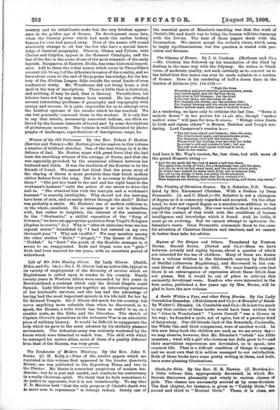The Odyssey of Homer. By J. G. Cordery. (Methuen and
Co.). —Mr. Cordery has followed up his translation of the Iliad by dealing in the same way with the Odyssey. He writes in blank verse, of moderate quality, not such certainly as to convert us to the belief that this metre can ever be made suitable to a version of Homer. Here is his rendering of half a dozen lines in the Garden of Alcinous (vii. 114-119)
Nigh the trees Flourished and grew therein, pomegranates, pears, Gay-tinted apple. and the fig-tree sweet, And olive in full blossom : nor the fruit Fails ever there, nor dies away at all, Nor through the winter, nor the summer tide ; For Zephyr blowing soft the whole year through
Makes mellow some, while some it maketh flower."
As a rendering, we have only to criticise the last line. "Some it maketh flower" is too precise for re's ;Ay ot.Csi, though "makes mellow some" will pass for taxa Si rgercret. "Brings some fruits to birth and ripens others" is Messrs. Butcher and Long's ren- dering. Lord Carnarvon's version is
The tall trees stand and blossom; then the pear, The bright-hued apple, and pomegranate grow, The blooming olive and the lusoious fig, Whose fruit the livelong year nor fails nor fades In wieter's cold and summer's heat ; but aye The soft west wind ripens or,brings to birch Each in due season."
And here is Mr. Way's version, far, less close, but with more of the grand Homeric swing :— " And the fat earth fed the root of many a tall tree there,
The apple-tree, lovely of fruit, the pomegranate tree, and the pear, And the fig with its full sweet taste, and the silvery olive's pride. No blight ever cometh to waste their fruit, nor in summer tide,
Nor yet in the winter it fails, but softly blows evermore
The breath of the Western gales that fairy orchard o'er ; Here blossoms are blowing, and there, fruits growing, and there, ripe store,'


































 Previous page
Previous page